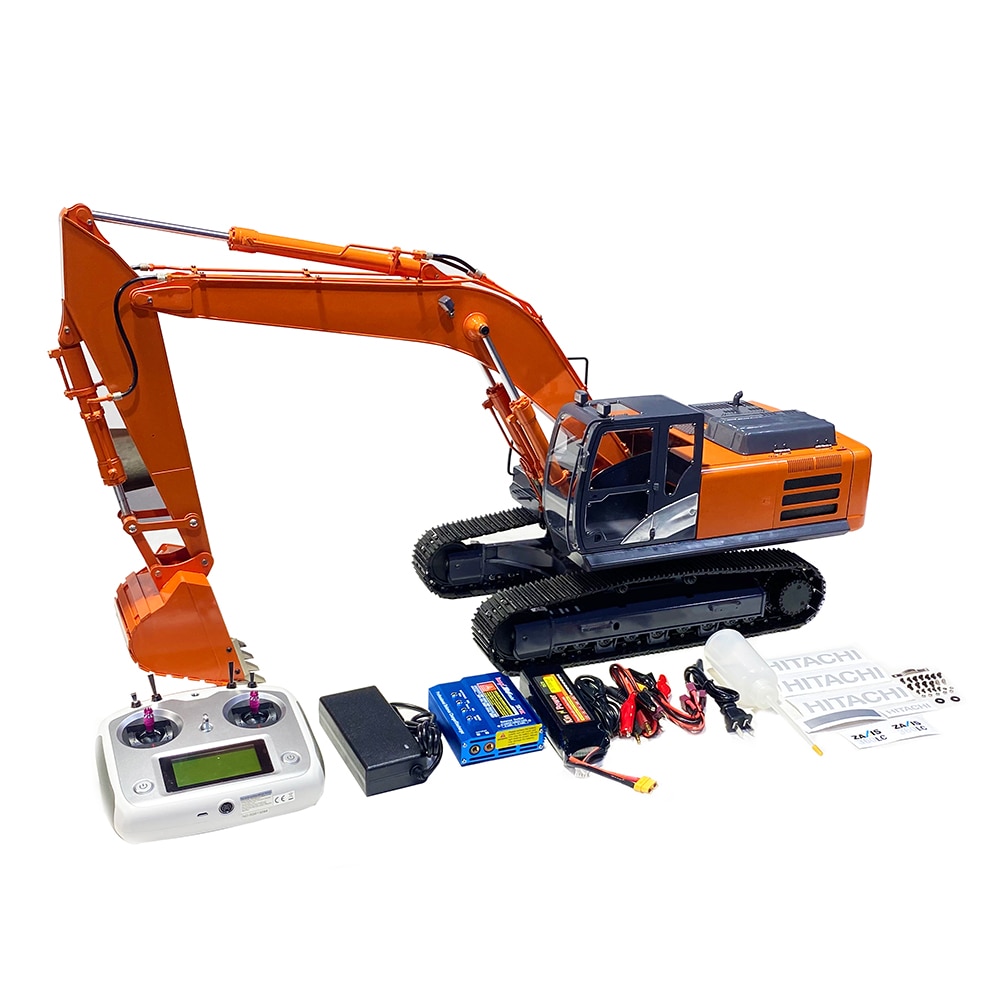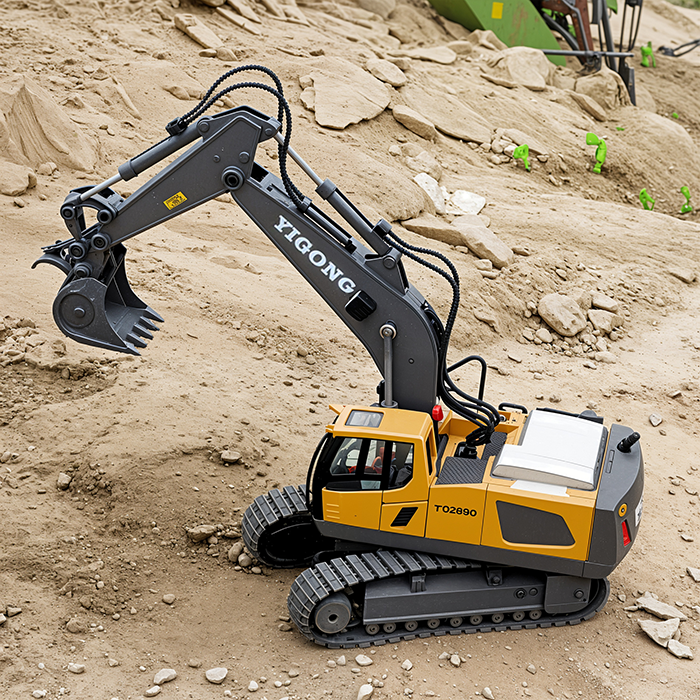Comprehending How Excavator Works and Its Effect On Efficiency
Excavators play a vital duty in construction and mining operations, counting on a complicated interplay of mechanical and hydraulic systems. Their capability to carry out a range of jobs hinges on both their layout and the technology incorporated within. Recognizing these components can greatly influence operational efficiency and productivity. As advancements continue to improve the sector, one must think about how these changes will certainly affect future methods and efficiency.
The Fundamentals of Excavator Mechanics

The Function of Hydraulic Systems in Excavators
At the heart of excavator operation exists the hydraulic system, which plays a pivotal role in powering the machine's features and movements. This system utilizes pressurized hydraulic liquid to transfer power, allowing various activities such as training, digging, and swinging. By utilizing the principles of hydraulics, excavators can do jobs with amazing accuracy and pressure, boosting general operational efficiency.The hydraulic system contains key components, consisting of pumps, cyndrical tubes, and shutoffs, which interact to control the circulation and instructions of the fluid. When the driver engages the controls, the hydraulic fluid is routed to certain cylinders, translating the operator's commands right into physical motion. This system permits smooth and responsive actions, which are essential in building and construction and excavation settings. double e volvo rc excavator. The efficiency of the hydraulic system directly influences the productivity and convenience of the excavator, making it an important component in modern excavation procedures
Key Components of an Excavator
Recognizing the crucial parts of an excavator is crucial for realizing just how this effective equipment runs. An excavator contains several substantial aspects, including the undercarriage, home, boom, arm, and container. The undercarriage gives stability and mobility, usually featuring wheels or tracks to navigate numerous terrains. Your house has the engine and hydraulic systems, enabling the driver to manage activity and power the equipment. The boom extends from your home, allowing vertical reach, while the arm links to the pail, assisting in digging and training operations.Additionally, the taxi houses the driver, outfitted with controls for accurate handling. Each of these parts plays an essential function in the excavator's total capability, adding to its efficiency and effectiveness on building websites. Recognizing these components aids in maximizing and keeping excavator efficiency, making sure tasks are completed safely and efficiently.
Add-on Flexibility and Its Benefits
Add-on versatility is a crucial facet of excavators, allowing drivers to switch over between different tools tailored for certain jobs. This flexibility not only improves work performance yet additionally adds to cost-effectiveness by reducing the need for several devices. Recognizing the various sorts of accessories offered can substantially influence the total performance and performance of an excavator on task websites.
Kinds of Add-ons
While excavators are mainly recognized for their digging abilities, their true flexibility hinges on the broad range of attachments readily available. These accessories improve the excavator's performance, permitting it to execute different jobs beyond excavation. Usual attachments include pails (for excavating and scooping), hydraulic thumbs (for realizing materials), and augers (for drilling openings) Grapples are used for managing and moving particles, while rippers can separate tough surfaces. Various other specialized accessories, such as plates and plows, enable excavators to adapt to particular job requirements. This variety not just boosts the maker's utility across different fields, consisting of landscaping, demolition, and construction, but likewise permits operators to customize their equipment to meet specific project demands successfully.
Increased Task Performance
Taking full advantage of work efficiency is a primary benefit of making use of different excavator attachments. Different add-ons permit an excavator to perform several jobs without needing to change equipment, saving useful time and labor. Utilizing a hydraulic hammer can damage concrete while a pail attachment can dig deep into soil, allowing a smooth workflow. This convenience lowers downtime related to tools changes and enhances productivity on-site. Additionally, specialized attachments boost accuracy in tasks such as grading or landscape design, resulting in better outcomes. The ability to adjust to various job requirements not only improves operations however likewise minimizes the requirement for additional machinery, guaranteeing that tasks are finished promptly this post and efficiently. In general, attachment adaptability substantially adds to boosted task efficiency in excavation job.
Cost-Effectiveness and Flexibility
Cost-effectiveness is a considerable benefit of utilizing flexible excavator add-ons. These attachments permit a solitary excavator to execute multiple tasks, lowering the need for additional equipment and labor - double e volvo rc excavator. By switching between pails, hammers, and grapples, operators can tackle different jobs, from excavating to demolition, consequently optimizing devices application. This adaptability not only reduces operational costs yet also lessens downtime connected with changing tools. Furthermore, the ability to personalize excavators with specialized accessories enhances productivity, as they can successfully deal with varied jobs according to project demands. In conclusion, the combination of cost-effectiveness and versatility in excavator attachments adds to improved functional efficiency and source allocation in building and construction and excavation projects

Advanced Technology in Modern Excavators
Modern excavators are progressively outfitted with advanced technology that transforms excavation processes. Automation streamlines procedures, while enhanced fuel performance reduces operational prices. Additionally, clever control systems improve precision and security, marking a considerable evolution in excavation tools.
Automation in Excavation Processes
As excavation technology advances, automation has actually emerged as a crucial component in enhancing effectiveness and precision on work sites. Modern excavators are outfitted with innovative automated systems that assist in tasks such as grading, digging, and trenching with minimal driver intervention. These systems use sensing units, GPS, and equipment discovering algorithms to ensure precise placing and deepness control, substantially reducing the margin for error. Furthermore, automation allows operators to concentrate go now on strategic decision-making instead of hand-operated controls, leading to improved productivity overall. Such advancements not just simplify operations however also enhance safety by lessening human mistake in intricate procedures. Subsequently, the combination of automation in excavation processes represents a significant innovation in construction technology, driving the sector in the direction of better effectiveness and effectiveness.
Boosted Fuel Efficiency
Advancements in innovation have actually likewise led to significant enhancements in fuel efficiency for modern excavators. Modern makers are furnished with innovative engines that enhance power outcome while decreasing fuel consumption. These engines make use of ingenious burning innovations, such as turbocharging and direct fuel injection, to boost efficiency and effectiveness. Furthermore, light-weight materials in construction decrease general weight, enabling for much less power expense throughout procedure. The intro of variable speed controls enables drivers to readjust engine performance according to certain tasks, better minimizing fuel usage. As an outcome, these improvements not only lower functional expenses but additionally add to environmental sustainability by reducing exhausts. Generally, improved fuel efficiency in excavators is a necessary advancement that boosts efficiency and economic viability in the building and construction market.
Smart Control Systems
While operators browse progressively intricate task websites, wise control systems in excavators have become essential devices for improving performance and accuracy. These advanced innovations make use of algorithms and sensors to monitor different specifications such as load weight, surface conditions, and operational efficiency. By instantly readjusting hydraulic features, wise systems optimize machine efficiency, bring about improved performance and decreased wear on elements. Furthermore, drivers profit from intuitive interfaces that offer real-time feedback and diagnostics, enabling notified decision-making. This combination of modern technology not only enhances procedures but additionally lessens human mistake, adding to safer work environments. As the construction sector continues to develop, clever control systems will play an essential duty fit the future of excavator effectiveness and performance.
Enhancing Functional Effectiveness With Excavators
Excavators play a necessary duty in improving functional performance throughout different building and excavation tasks. Their adaptability enables for numerous jobs, including product, digging, and training handling, which simplifies operations and decreases the demand for added devices. With effective hydraulic systems, excavators can perform heavy-duty tasks with accuracy, considerably reducing the time needed to full projects. The combination of advanced technology, such as GPS and automated controls, additionally enhances their operation, making it possible for drivers to accomplish higher accuracy and reduce material waste. Additionally, modern excavators are created to consume less gas and blog here minimize discharges, adding to both cost financial savings and environmental sustainability. By using excavators successfully, construction teams can boost efficiency, fulfill task target dates, and enhance total site management. This multifunctionality and effectiveness make excavators essential tools in the modern construction landscape.
The Future of Excavators in Building and Mining Industries
As the building and construction and mining sectors develop, the future of excavators is positioned for significant transformation driven by technical innovation and altering operational demands. Breakthroughs in automation and expert system are improving excavator capacities, enabling for improved accuracy and efficiency in procedures. Self-governing excavators are arising, reducing the requirement for human treatment and minimizing the danger of accidents.Moreover, the combination of telematics and IoT technology enables real-time monitoring of machine efficiency and anticipating upkeep, optimizing uptime. Green designs, consisting of hybrid and electrical models, are acquiring traction, aligning with sustainability goals within the industry.Additionally, the usage of advanced products and lighter designs improves gas effectiveness while maintaining performance standards. As these trends progression, excavators will certainly play an essential role in fulfilling the boosting needs for efficiency and safety and security in building and construction and mining, eventually transforming operational landscapes.
Regularly Asked Concerns
Just How Do Weather Affect Excavator Performance?

Weather condition conditions considerably affect excavator efficiency, as rainfall and mud can impede traction and security, while extreme temperature levels might influence hydraulic systems. Operators should adapt to these variables to assure suitable performance and safety during operations.
What Safety And Security Measures Should Operators Follow While Utilizing Excavators?
Precaution for excavator drivers consist of using appropriate individual protective equipment, carrying out pre-operation examinations, making sure proper interaction with ground personnel, keeping a secure range from overhanging dangers, and sticking to well-known functional protocols to avoid crashes.
Just How Often Should Excavators Be Maintained for Optimal Efficiency?
Excavators ought to be preserved frequently to ensure peak performance, commonly every 250 operating hours or as defined by the supplier. Regular checks enhance reliability, stop unexpected break downs, and prolong the life-span of the tools.
What Is the Typical Life Expectancy of an Excavator?
The ordinary life-span of an excavator commonly varies from 10,000 to 15,000 hours of procedure. Aspects affecting durability include maintenance methods, running conditions, and the high quality of the maker itself, affecting overall productivity and efficiency.

Can Excavators Operate Unequal Surface Effectively?
Excavators can operate effectively on unequal surface because of their verbalized layouts and flexible tracks. These functions permit them to maintain stability and grip, making it possible for effective procedure in challenging environments frequently run into in building and construction and landscape design jobs. Each of these parts plays an important duty in the excavator's overall capability, adding to its performance and performance on building and construction sites. Optimizing task performance is a primary benefit of utilizing various excavator add-ons. While drivers navigate significantly complex job sites, clever control systems in excavators have emerged as important tools for improving efficiency and accuracy. Excavators play an essential duty in enhancing operational effectiveness across numerous building and excavation projects. Advancements in automation and synthetic intelligence are reshaping excavator capabilities, enabling for enhanced accuracy and efficiency in procedures.